Story of the Origin of Panamanian Rosa Coffee Variety characteristics of hand-flavored flavor of Rosa coffee washed with sun water
Consumers who come to Qianjie to drink coffee have a very large age range, so Qianjie found a very interesting phenomenon: in the minds of the older generation of coffee lovers, the best coffee is Blue Mountain Coffee. For the slightly younger coffee consumers now, the pursuit of the best and most expensive coffee has changed from the Blue Mountains to a rosy summer.
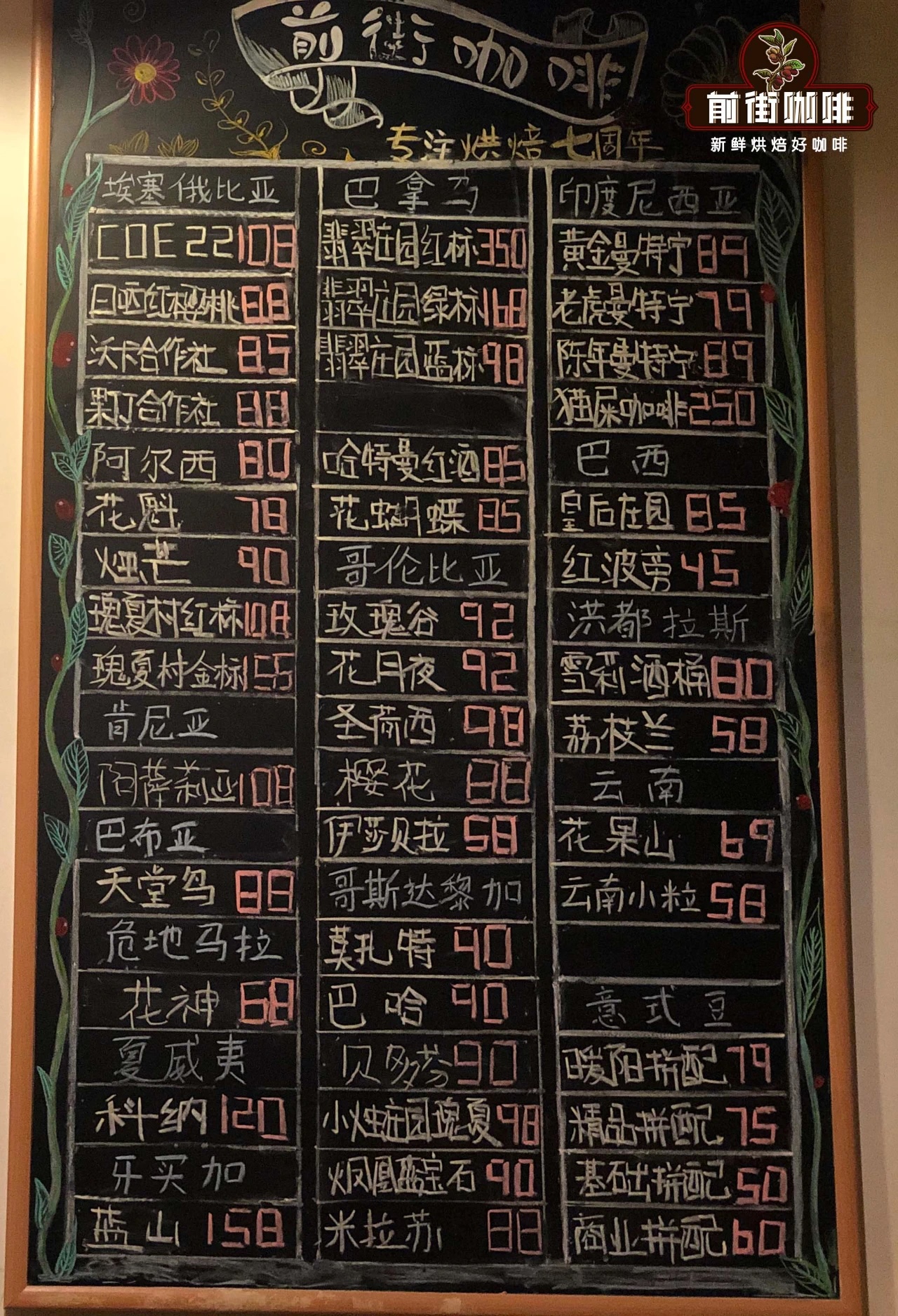
In the process of daily operation of Qianjie stores, Qianjie also felt everyone's enthusiasm for rose summer coffee. Many coffee lovers will want to order a cup of rose summer coffee when they learn that the most expensive red label rose summer coffee in Qianjie costs only 75 yuan. But if you take a closer look at the bean list on the front street, you will find that there are two countries of rose summer on the bean list of the front street coffee shop, one is Ethiopia, and the other is Panama. Of course, two new types of Rosa coffee beans have recently been introduced, one from Colombia and the other from Costa Rica.
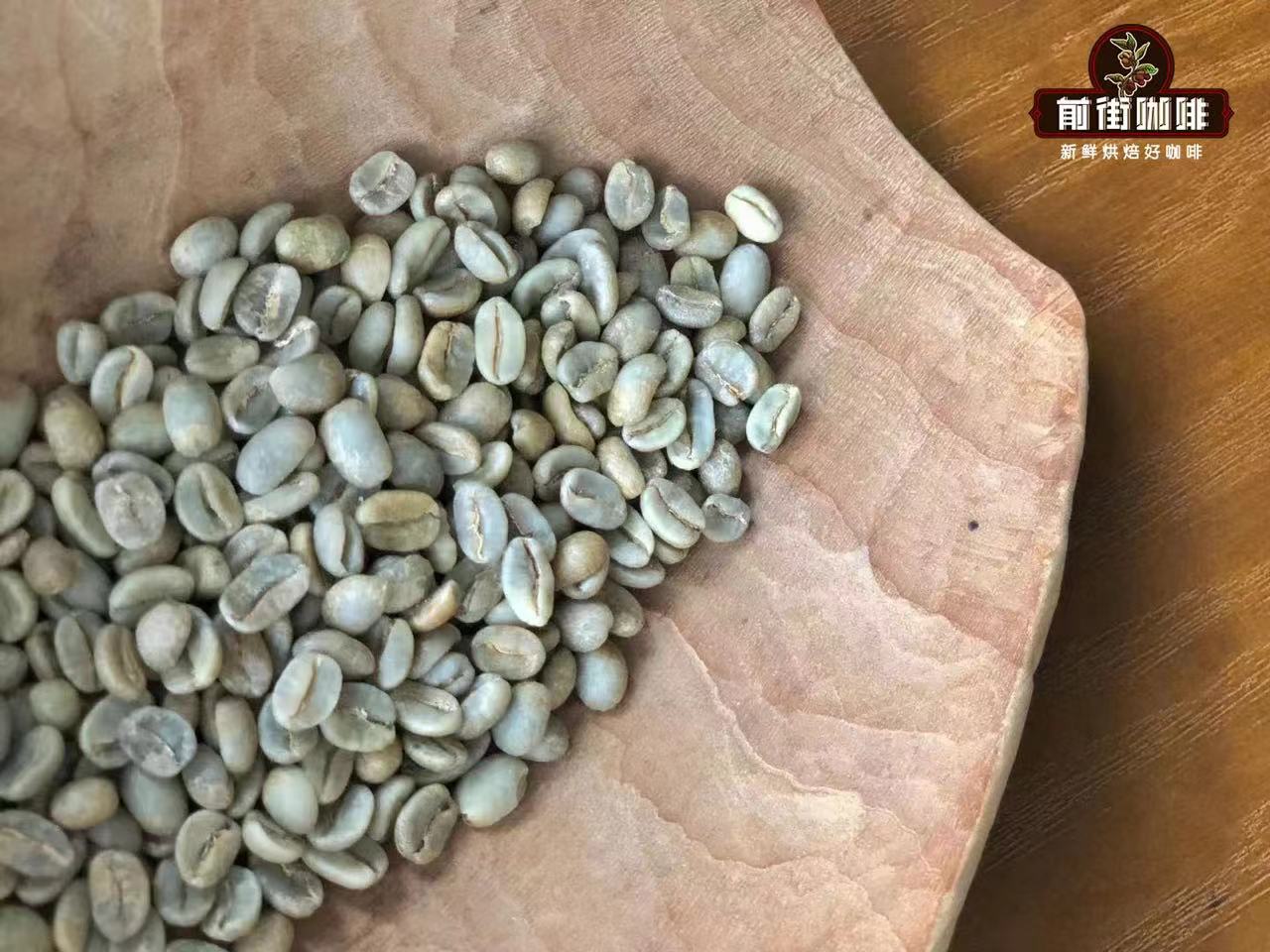
Speaking of Rose Summer, how much do you know about it? Rose summer is famous in Panama, and after testing by the authorities, the origin of rose summer is in Ethiopia. Next, Qianjie will tell you a story about the variety of Rosa coffee beans and related history: the variety was discovered in the Rosa Forest of Ethiopia in 1931 and sent to the Coffee Institute in Kenya in 1932. It was introduced to Uganda and Tanzania in 1936 and Costa Rica in 1953. And arrived in Panama in 1960.
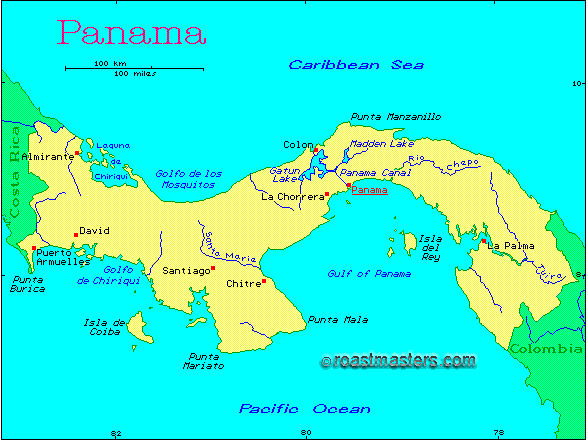
Now when it comes to rosy summer coffee, everyone defaults to Panamanian rosy summer. Then Qianjie would like to take advantage of this time to tell you about the coffee bean producing areas of Panama and the world-famous Jade Manor. For the simplest knowledge of geography, Panama is located in Central America. Through the world map, we can clearly see that Panama is bounded by Colombia in the east, the Pacific Ocean in the south, Costa Rica in the west and the Caribbean Sea in the north. It is located in the coffee growing zone between 7 °and 10 °north latitude. And the iron of boutique coffee: grow coffee trees at an altitude of more than 12000, and Panama has also done so. The eastern part of Panama is at a low altitude, and the western part of the country is the most suitable for growing coffee. Panama's three main coffee producing areas are concentrated in Panama's Chiriki province.
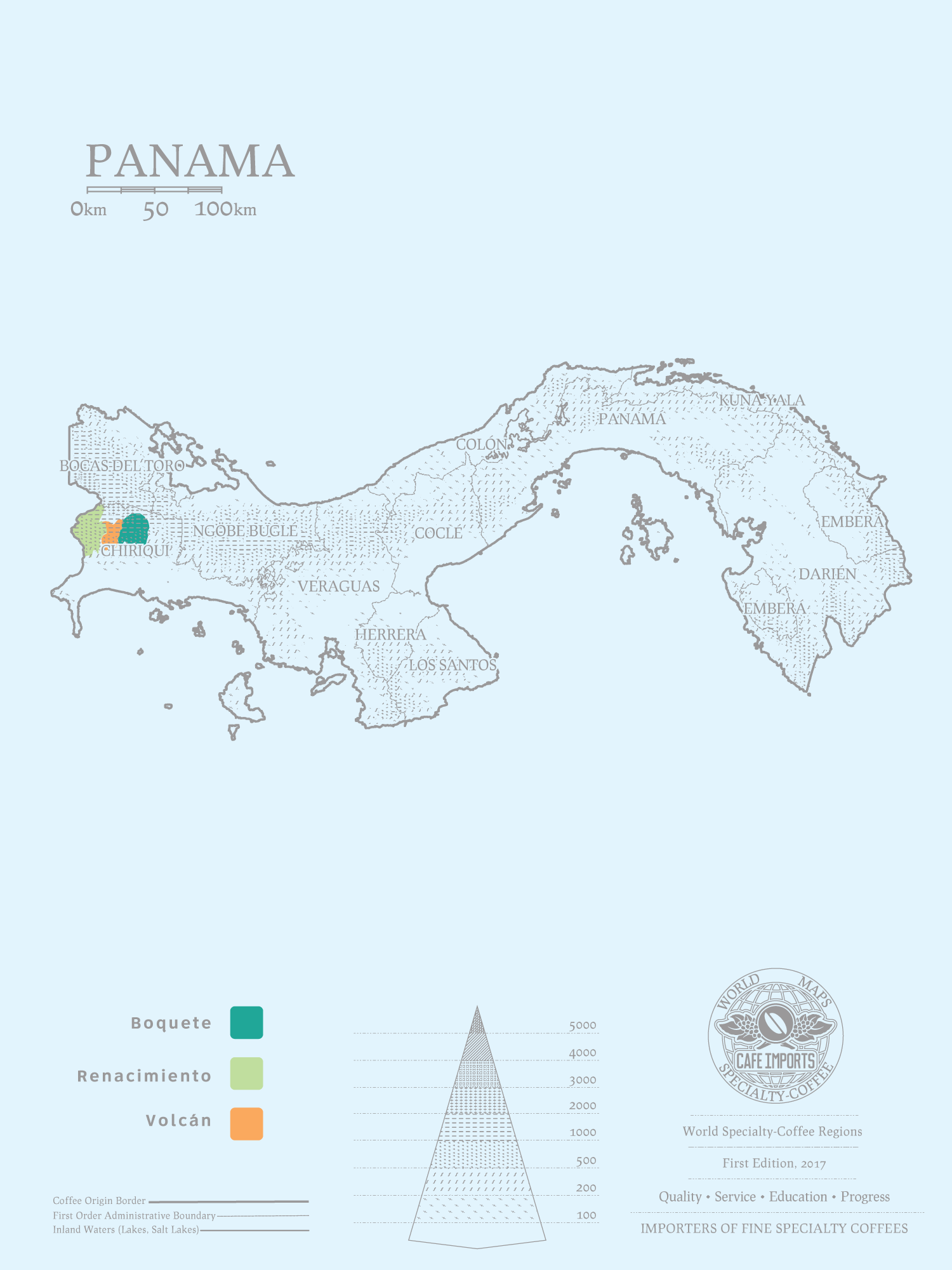
According to the understanding of Qianjie, the boutique coffee growing areas in Panama are mainly divided into three: Boquete, Volcan and Renacimiento. Among them, the Pokuit producing area is the most famous, with an average elevation of between 1400 and 1900 meters above sea level, near the border with Costa Rica to the west. And this Pokuit area has many excellent estates, such as Arida Manor, Emerald Manor and Duncan Manor. This producing area is located in Baru Volcano, with fertile volcanic ash soil and changeable microclimate.
The Emerald Manor of Panama can be called a coffee plantation with a long history. In 964, Rudolph Peterson, a retired American banker, moved to Panama and bought what is now the Emerald Manor. In 1973, the banker's son chose to go home to help with the estate after getting his doctorate. Two coffee beans, Kaddura and Kaduai, were introduced in 1987. A washing plant was set up in 1994, and a coffee processing plant of its own was set up. In 1997, the nearby Haramiyo Manor was purchased and classified as the Emerald Manor.
Today, the Jade Manor has three plots: Canas Verdes, Jaramillo and El Velo. Qianjie also learned the details of these three plots on the official website of the Jade Manor:
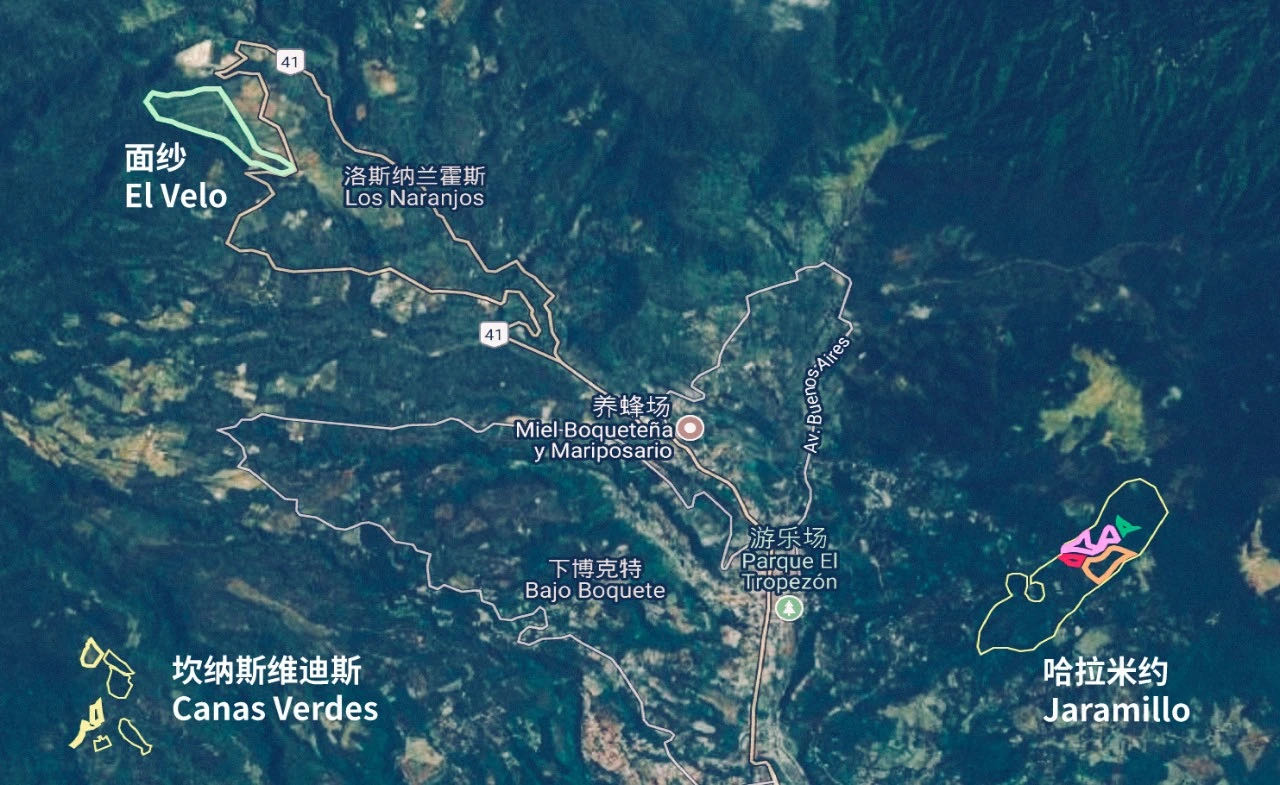
The annual rainfall of Canas Verdes is 3500ml, the average temperature in daytime is 16-23 ℃, the average temperature at night is 10-15 ℃, and the average altitude is 1600-1800m. Cannes consists of nine small plots: Lino (flax), Coronado (coronation), Fundador (founder), Le ó n (Leon), Montaa (peak), Trapiche (sugar), Chinta (urn), Cabaa (cabin) and Tumaco (Tumako). The annual rainfall of Jaramillo is 4000ml, the average temperature in daytime is 19-25 ℃, the average temperature at night is 11-15 ℃, and the average altitude is 1600-1700m. The Haramiyo site is subdivided into five small plots: Mario (Mario), Noria (Ferris wheel), Reina (queen), Bosque (forest) and Buenos Aires (Buenos Aires). Veil (El Velo) is the latest purchase of the Jadeite Manor, with an average elevation of 1700-1900m. In addition to planting Rosa and Kaduai, the site also has a small number of other exotic species, such as Laurina, Pakamara, Mocha and SL28. The veil is divided into seven small plots, namely: Guabo, Port ó n (Portal), Durazno (Peach), Higuer ó n (fig tree), Higo (fig), Buena Vista (Buena Vista) and guila (Eagle).
Qianjie believes that one of the reasons why the coffee beans of the Jade Manor are so popular is that the manor has a very fine grading system, in order to meet the taste preferences of different audiences. In order to meet the taste preferences of different audiences, the Jadeite Manor's rose summer coffee is divided into jadeite special selection, private collection and rose summer 1500 according to planting altitude, planting speed and cup test performance. (the Rose Summer 1500 rating system has been abolished in 2021.), here is a big introduction to these three grades of Rose Summer Coffee.
First, let's take a look at the emerald special selection. Jadeite specially selected coffee beans are actually the so-called red standard coffee beans in China. His planting altitude is from 2600 meters to 1800 meters, and the cup test score is more than 90 points. It comes from the Haramillo and Canasvidi plots.
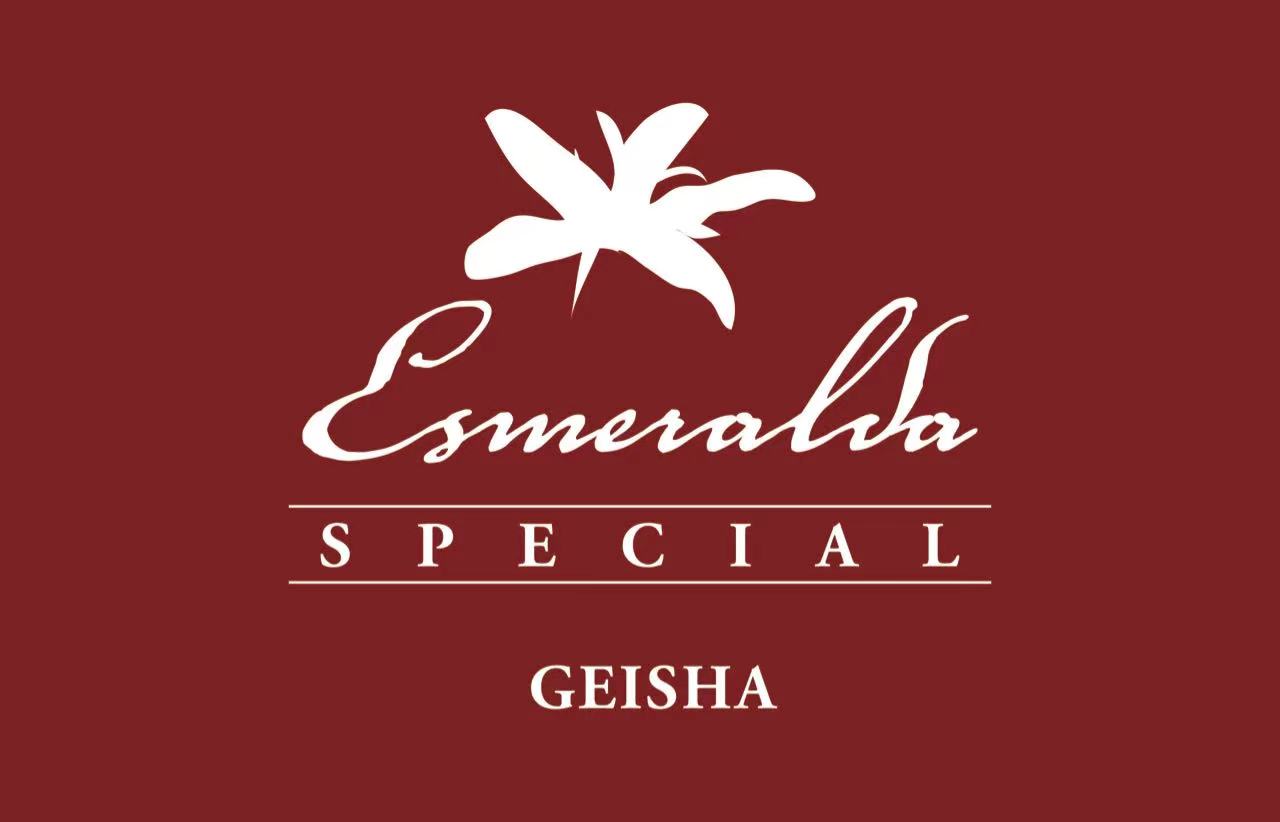
Feicui Manor holds its own independent bidding every year, and the Rose Summer lot taken out for bidding in the divided plots is the red bid. And now there are also non-competitive red bids on the market, in fact, the unbidding rose summer in the same plot is circulated to the market, its varieties and quality are the same, but the price is different. Red standard rose summer is treated by sun or water washing, which has a special and bright floral and citrus flavor.
The latest batch of Red label Rose Summer on Front Street, from the Mario plot of Haramillo Farm, is slowly tanned, with aromas of jasmine, citrus and berries and honey sweetness.
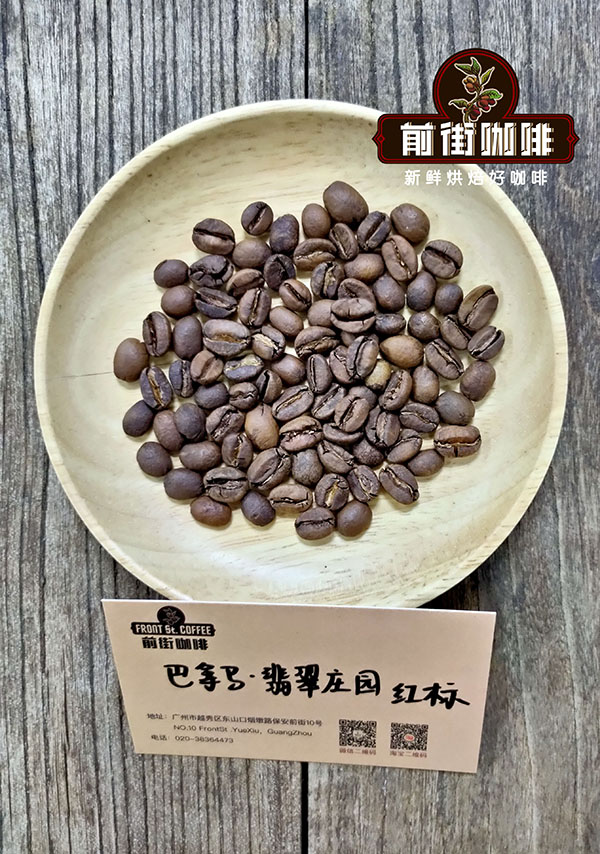
Jadeite Manor Red Standard Rose Summer
Production area: Panamanian Jade Manor Mario plot altitude: 1700mm varieties: rose summer seed treatment: slow sun flavor: citrus, jasmine, honey, berries
Private collection, commonly known as green standard, a batch of non-independent competitions, planting rose summer varieties that do not participate in bidding but are still of excellent quality. Micro-batches of mixed beans from different plots such as Haramillo and Cannes Vidis are selected for planting between 1600 and 1800 meters above sea level.

Because it is mixed beans, it is not specified in detail on the plot, but sometimes there is a high similarity between the green label flavor and the red standard flavor. Although the green standard is not as good as the red standard, it still has the classic Rose Summer flavor. Like the red mark, it is also washed or tanned.
Jadeite Manor Green label Rose Summer
Production area: Panamanian Pokuit altitude: 1600m--1800m varieties: rose summer seed treatment: washing flavor: jasmine, citrus, melon, berries, orange peel.
Finally, let's talk about the most common blue label Rose Summer, Rose Xia 1500 is the common blue label. Its selected altitude is also shown in the brand name, 1400 meters to 1500 meters, produced from Haramillo, Cannes Vidis, veil of these three plots of mixed beans. In 2020, the blue standard of the Emerald Manor added the way of water washing treatment, and the blue standard also has water washing and sun treatment. However, the Emerald Manor has a new move in 2021, which will abolish the blue label, which also means that the blue label will disappear and will be gone after drinking. As for the specific reason for abolishing the blue mark, the reason is unknown.

Jadeite Manor Blue label Rose Summer
Production area: Panamanian Pokuit producing area altitude: 1500m varieties: rose summer seed treatment method: sun flavor: lemon, oolong tea, sucrose, peach
Regular customers in front street should know that the green sign in front street is washed and sunburned, so many consumers will ask baristas in front street what is the difference between the two? Today, Qianjie will compare the two in this article. Before we do it again, let's take a look at the difference between the two approaches.
Sun-dried beans are treated by drying the whole coffee cherry, retaining the peel and pulp during the drying process. That means that the flavor of sun-dried beans is more complex than that of water-washed beans, sun-washed beans are sweeter than water-washed beans, and water-washed beans are cleaner and brighter than sun-washed beans.
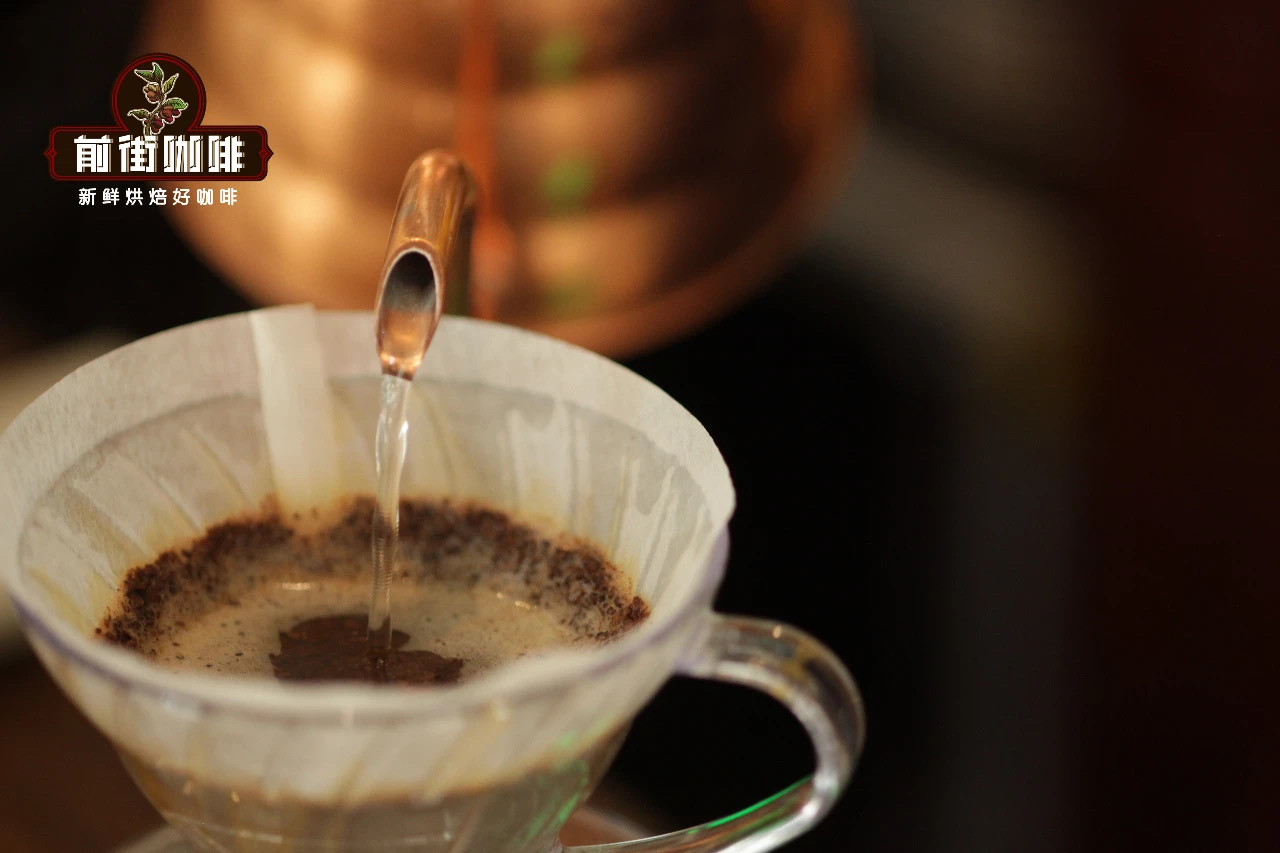
Front street coffee hand brewing parameters: filter cup: V60 # 01 coffee powder quantity: 15g powder water ratio: 1:16 grinding degree: EK43s#10.2 water temperature: 90-91 degrees
Qianjie coffee uses staged extraction, also known as three-stage brewing, steaming with 30 grams of water for 30 seconds, small water injection around the circle to 125 grams for stages, water level drop to 225 grams when the powder bed is about to be exposed, remove the filter cup when the water level drop is about to expose the powder bed, (steaming starts timing) the extraction time is 2 grams 3900 "- 2 grams 3905".
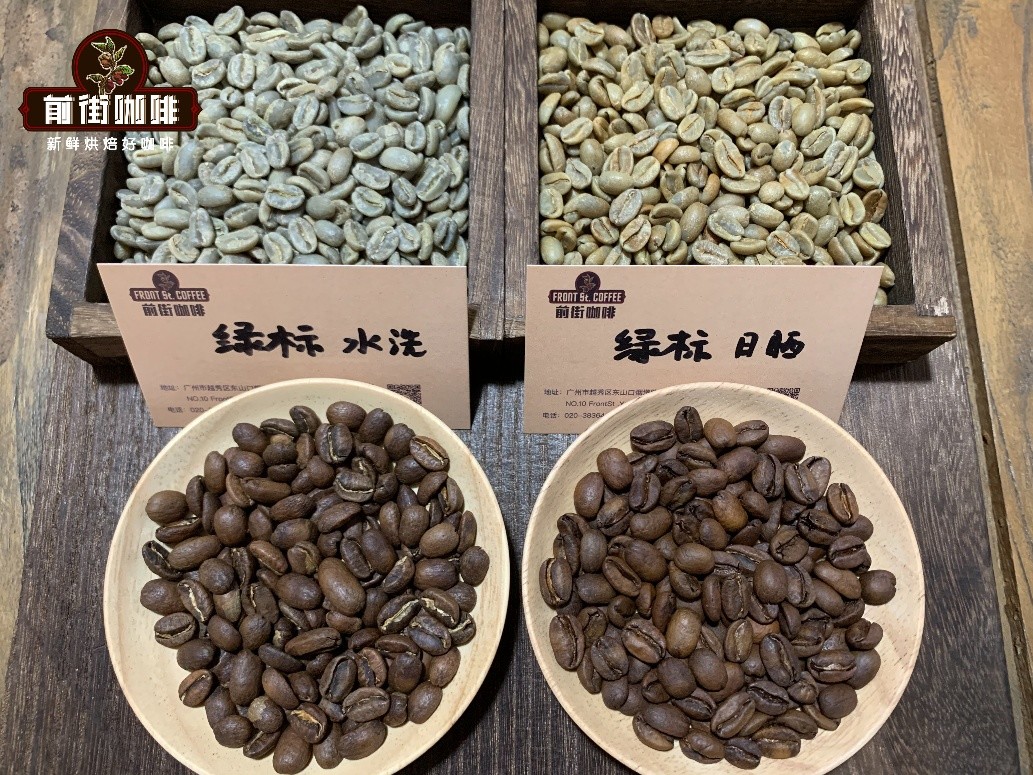
[washing green label] Flower aroma, with soft sour notes of citrus and grapefruit in the entrance, honey in the middle, sweet oolong tea and brown sugar at the end, clean, bright and full taste. [sun Green Standard] it smells fermented aroma and fruit sweetness, tastes like melons and tropical fruits, and tastes like fruit juice. The overall sweetness is very high.
Professional coffee knowledge exchange more coffee bean information please follow the coffee workshop (Wechat official account cafe_style) more boutique coffee beans please add private Wechat Qianjie coffee, WeChat: kaixinguoguo0925
Important Notice :
前街咖啡 FrontStreet Coffee has moved to new addredd:
FrontStreet Coffee Address: 315,Donghua East Road,GuangZhou
Tel:020 38364473
- Prev
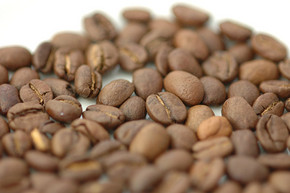
What is Geisha Rose Summer Coffee?
Following Cafe Review (Wechat official account vdailycom) found that Beautiful Cafe opened a small shop of its own. What is Geisha? Geisha is a high-priced coffee, often reminiscent of Panamanian coffee. In fact, Geisha was discovered in the rose summer forests of Ethiopia in 1931 and has only been cultivated since the 1960s. The Geisha tree is taller and beautiful
- Next
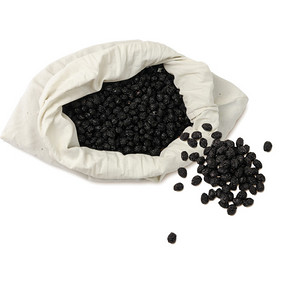
An introduction to the History of Rosa Coffee in Esmeralda Farm
Follow the comment (Wechat official account vdailycom) and discover the history of Esmeralda Farm, a small shop opened by Beautiful Cafe: Haines, Swede, 1924. Elliott founded Esmeralda Farm, which was not a coffee grower but a ranch. Forty years later, Daniel Lou in 1964. Mr. Bidarson's grandfather, Luther Ruffer. Mr. Bidarson, in order to retire, there is an old man.
Related
- Detailed explanation of Jadeite planting Land in Panamanian Jadeite Manor introduction to the grading system of Jadeite competitive bidding, Red bid, Green bid and Rose Summer
- Story of Coffee planting in Brenka region of Costa Rica Stonehenge Manor anaerobic heavy honey treatment of flavor mouth
- What's on the barrel of Blue Mountain Coffee beans?
- Can American coffee also pull flowers? How to use hot American style to pull out a good-looking pattern?
- Can you make a cold extract with coffee beans? What is the right proportion for cold-extracted coffee formula?
- Indonesian PWN Gold Mandrine Coffee Origin Features Flavor How to Chong? Mandolin coffee is American.
- A brief introduction to the flavor characteristics of Brazilian yellow bourbon coffee beans
- What is the effect of different water quality on the flavor of cold-extracted coffee? What kind of water is best for brewing coffee?
- Why do you think of Rose Summer whenever you mention Panamanian coffee?
- Introduction to the characteristics of authentic blue mountain coffee bean producing areas? What is the CIB Coffee Authority in Jamaica?

